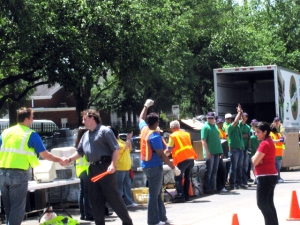Holidays are a time when we are giving and receiving a lot of new toys, including updated electronics. Even though our 1st generation iPad is still working just perfectly the lure of the 2nd generation have caught our eyes and its out with the old and in with the new! Each year millions of children’s toys are purchased for Christmas and a large percentage of these require batteries. Typically these toys do not only require one battery but rather two, four, or even six. The most popular toy for this year is expected to be Lets Rock Elmo which requires six batteries for operation. Well, after countless hours of rocking with Elmo, he will need new batteries which will begin a large collection of out dated batteries!
What are the different kinds of batteries and what do I do with them?
There are 6 main types of batteries we come into contact with regularly:
- Alkaline batteries: these are the AA batteries we use in remote controls, childrens toys, and surprisingly there are no real harmful elements found in these batteries. When these are brand new they deliver 1.5 volts and continuously drop down to below 1 volt throughout their lifespan. They were not originally designed to hold the higher charges required by todays electronics which is why many manufacturers have resorted to NiMH batteries.
- NiMH batteries (Nickel-metal Hydride): these have the same size and appearance of an alkaline battery but hold 1.2 volts throughout their entire lifespan. These batteries can be charged and recharged multiple times.
- NiCad batteries (Nickel-Cadmium): these are older model rechargeable batteries that used to be the common battery for all portable devices but now are found in cheaper and older mobile phones. They must be disposed of properly to prevent environmental harm and can be properly recycled by CompuCycle. The toxic element in these batteries is the Cadmium metal.
- Lithium-ion batteries: the current and most popular battery for cellphones and laptops. They are more expensive but much lighter than a NiCad and have longer duration.
- Lead-acid: these are the oldest type of rechargeable batteries and those still used in cars. We can accept these at our facility as long as no materials are leaking from the battery.
- Uninterruptible power supply batteries (UPS): these are large devices used by companies to ensure they do not lose power when the main power supply goes down in an emergency situation.
All of the above mentioned batteries can be dropped off at CompuCycle’s recycling facility free of charge, except if it is a lead-acid battery that is leaking fluids. Please feel free to bring them by:
Monday – Friday 8:30 am – 4:30 pm
Saturday 9:00 am – 3:00 pm
Or if you are with a company that has large UPS batteries or any other materials call CompuCycle today to schedule a collection!
CompuCycle wants to wish you all a happy, healthy, and safe holiday season and Happy New Year! We look forward to e-cycling with you in 2012!
